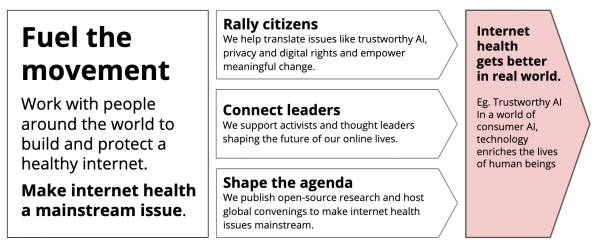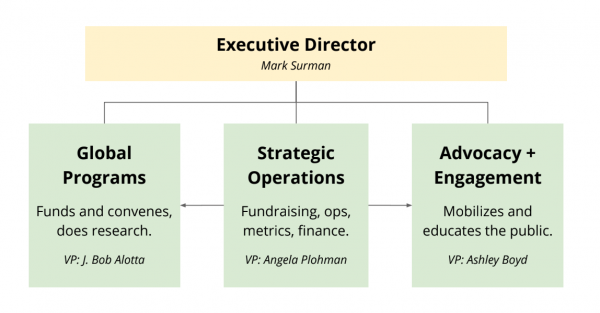Foundation
Overview
Guided by the Mozilla Manifesto, the Mozilla Foundation works to ensure the internet is a global public resource that must remain open and accessible to all.
What follows is documentation of Mozilla Foundation’s current movement building strategy in three phases:
- Phase I, 2016: Launch movement strategy for internet health
- Phase II, 2019: Focus on trustworthy AI theory of change
- Phase III, 2021+: Hone in on specific AI impact
Recent important documents:
- Big picture: Trustworthy AI white paper (published December 2020)
- Trustworthy AI theory of change (PDF, October 2020)
- Mozilla's 2021+ trustworthy AI priorities (blog post, February 2021)
- 2021-2023 narrative arcs for our work on transparency, bias and data stewardship (PDF, February 2021)
- Mozilla Foundation’s 2021 Objectives and Key Results (wiki, 2021)
- Mozilla’s vision for trustworthy AI (blog post, December 2020)
This wiki was updated in February 2021.
About Mozilla Foundation
Mozilla exists to guard the open nature of the Internet and to ensure it remains a global public resource, open and accessible to all. Founded as a community open source project in 1998, Mozilla currently consists of two organizations: the 501(c)3 Mozilla Foundation, which leads our movement building work; and its wholly owned subsidiary, the Mozilla Corporation, which leads our market-based work. The two organizations work in concert with each other and a global community of tens of thousands of volunteers under the single banner: Mozilla.
Strategy Phase 1, 2016: Fueling a movement for internet health
Mozilla believes that we all have a stake in understanding and protecting the health of the internet. Since 2016, the Mozilla Foundation has focused its efforts on fueling an emerging movement of internet users, technologists, researchers and activists who are standing and fighting for a healthy internet for generations to come.
Relevant links:
- The genesis of our strategy to fuel the movement (wiki, 2015-2018)
- Original strategy brief and theory of change (PDF, January 2018)
- Program evaluation from the first phase of our movement strategy (PDF, September 2018)
Focusing on Trustworthy AI (Phase 2 - 2019)
A key learning from our 2018 program evaluation was that we needed a more specific impact goal to drive our work forward. Since 2019, and as part of the second phase of Mozilla’s movement building strategy, we focused our work on developing trustworthy AI.
Mozilla has ideas for how to work towards AI that enriches the lives of human beings, rather than harms them. We call it ‘trustworthy AI’ and this framing guides a large part of our work. If we want a healthy internet — and a healthy digital society — we need to make sure AI is trustworthy. AI, and the large pools of data that fuel it, are central to how computing works today. If we want apps, social networks, our devices and government to serve us as people — and as citizens — we need to make sure the way we build with AI has things like privacy and fairness built in from the get go.
Relevant links:
- Mozilla’s vision for trustworthy AI (blog post, December 2020)
- Download our trustworthy AI white paper (published December 2020)
- Trustworthy AI theory of change (PDF, October 2020)
- Mozilla’s focus on AI + consumer tech (blog post, April 2019)
- Honing our focus on AI in the second phase of our movement strategy (blog post, March 2019)
- Background: Mozilla’s process towards focus on AI (wiki, 2019-2020)
Next Steps on Trustworthy AI: transparency, bias and better data governance (Phase 3 - 2021+)
When we turned our attention to AI, we started to ask: how can we make the data driven technologies we all use everyday more trustworthy? How can we make things like social networks, home assistants and search engines both more helpful and less harmful in the era ahead? In 2021, entering the third phase of our movement building strategy, we want to make concrete progress in three specific areas: transparency, data stewardship and bias. We also want to deepen our efforts to build alliances with other movements.
Mozilla Foundation’s 2021 work is organized around these themes:
- Test AI transparency best practices to increase adoption by builders and policymakers.
- Accelerate the impact of people working to mitigate bias in AI.
- Accelerate equitable data governance alternatives as a way to advance trustworthy AI.
We have also mapped out draft three year arcs in these areas to guide our work in the coming years. All of this maps to short term outcomes in our AI theory of change.
Relevant links:
- Read about our next steps on trustworthy AI (blog post, February 2021)
- 3 year narrative arcs (PDF, February 2021)
- Mozilla Foundation’s 2021 Objectives and Key Results (wiki, 2021)
Organizational Structure
In 2016, we restructured Mozilla Foundation to support internet health movement building work. We set up one team to work deeply with leaders and partners across the movement. And, another to inform and mobilize millions of people online. We also set up a team to guide our strategy and build the systems needed to do this work.
- Strategic Operations ensures that Mozilla Foundation has the people, systems and capabilities it needs to be a sustainable movement building organization.
- Global Programs supports the internet health movement through driving research (Insights), providing resources (Fellowships and Awards), and building connections (MozFest).
- Advocacy & Engagement mobilizes and educates the public, pressure companies to improve their practices and, over time, engage people in making AI more trustworthy.
Board
The Foundation board includes:
- Brian Behlendorf
- Helen Turvey
- Mitchell Baker
- Mohamed Nanabhay
- Nicole Wong
- Navrina Singh
- Wambui Kinya
Emeritus Board Members
- Bob Lisbonne
- Joi Ito
- Mitch Kapor
- Cathy Davidson
- Ronaldo Lemos
Visit our board wiki for more details including board slides
- https://foundation.mozilla.org/
- About the Foundation
- Strategy Retreats (2017-2019)
- MoFo monthly calls (2018-current)
- Mozilla Foundation annual OKRs (2017-current)



